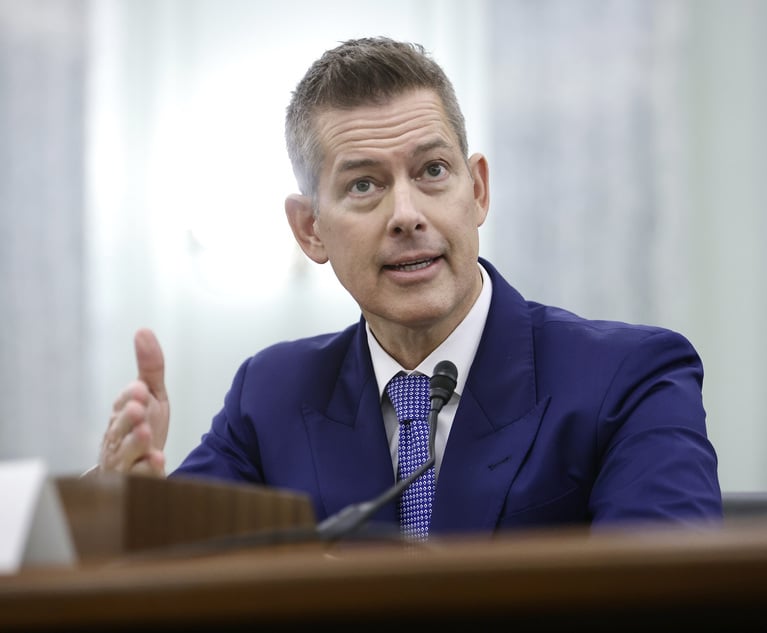Lessons From Celadon Deferred Prosecution Agreement: Upgrade Leadership, Follow Compliance Road Map
Trucking company Celadon has signed a deferred prosecution agreement with the U.S. Department of Justice to pay $42.2 million in restitution to settle securities fraud charges. The agreement runs for five years and does not impose a compliance monitor on the company, but shows how a company's response to a federal investigation can be paramount to obtaining a deferred prosecution agreement and avoiding an independent compliance monitor.
April 26, 2019 at 04:05 PM
4 minute read
 With headquarters in Indianapolis, Celadon employs approximately 4,000 employees and operates roughly 3,400 tractors and 10,000 trailers. Photo by Alan Petersime.
With headquarters in Indianapolis, Celadon employs approximately 4,000 employees and operates roughly 3,400 tractors and 10,000 trailers. Photo by Alan Petersime.
A key lesson from the April 25 Celadon Group Inc. accounting fraud case is that a company's response to a federal investigation can be paramount to obtaining a deferred prosecution agreement and avoiding an independent compliance monitor.
That's the opinion of Julie Myers Wood, CEO of compliance consultant Guidepost Solutions, after Celadon announced Thursday that it signed a deferred prosecution agreement with the U.S. Department of Justice. The Indianapolis-based trucking company agreed to pay $42.2 million in restitution to shareholders to settle securities fraud charges for “filing materially false and misleading statements to investors and falsifying books, records and accounts.”
The agreement runs for five years and does not impose a compliance monitor on the company, which also settled with the U.S. Securities and Exchange Commission.
Celadon CEO Paul Svindland said in a statement, “The settlements with DOJ and SEC mark an important milestone. … We appreciate the government's recognition of the significant changes we have made, our ongoing commitment to legal and regulatory compliance, and our significant cooperation in the investigations.”
Svindland is part of a new executive management team hired during the probe in 2017. The management changes included the general counsel, though in fairness, the former GC was not cited in the DOJ's statement of facts while the ex-CEO, chief financial officer and chief operating officer were mentioned.
Celadon promoted Chase Welsh to general counsel and executive vice president for risk management in October 2017. Welsh, who previously served as vice president for risk management, did not respond Friday to a message seeking comment. He replaced former general counsel Ken Core, who retired after 17 years with the company.
 Julie Myers Wood, CEO with Guidepost Solutions. Courtesy photo.
Julie Myers Wood, CEO with Guidepost Solutions. Courtesy photo.“DOJ continues its emphasis on holding individuals responsible,” Wood said. “Making personnel changes to address wrongdoing is often a key component before DOJ will even consider a [deal]. If you are senior leadership, it is likely that you will be terminated.”
The DOJ also charged one former executive who reached a plea deal. He was the president of a Celadon subsidiary that overvalued thousands of trucks in order to avoid booking losses. The DOJ continues to investigate other individuals.
Wood said, “It appears that Celadon cooperated with investigators and implemented remedial measures as quickly as possible,” including creating the position of chief accounting officer to enhance its internal audit function.
Wood noted that the DOJ release cited the auditing hire as a core remediation measure. “A robust internal audit program would likely have identified some of the falsified information,” Wood said.
Wood advised any company under investigation to cooperate fully, as Celadon did, and “waste no time undertaking remediation. Waiting to be told how to remediate, or waiting for the results of the investigation, does not convey to DOJ that a company is serious about fixing its problems.”
She said the decision by the DOJ to allow Celadon to self-report on compliance reforms and not to impose a monitor “must be a result of DOJ's satisfaction with the remedial measures already taken by the company and with the positive interactions during settlement. These Celadon facts should be instructive for other companies in arguing that a monitor is not necessary, even when conduct is egregious.”
Wood found one more valuable lesson for general counsel in the case. An attachment to the agreement provides a road map to what the DOJ expects in a compliance program. “It sets forth exactly how Celadon's internal controls, policies and procedures should be designed and implemented, including timelines,” she said. General counsel should benchmark their compliance programs against this, she suggested, “and be ready to discuss how they have met its standards” if the DOJ comes knocking.
This content has been archived. It is available through our partners, LexisNexis® and Bloomberg Law.
To view this content, please continue to their sites.
Not a Lexis Subscriber?
Subscribe Now
Not a Bloomberg Law Subscriber?
Subscribe Now
NOT FOR REPRINT
© 2025 ALM Global, LLC, All Rights Reserved. Request academic re-use from www.copyright.com. All other uses, submit a request to [email protected]. For more information visit Asset & Logo Licensing.
You Might Like
View All
After Botched Landing of United Airlines Boeing 767, Unlikely Plaintiff Sues Carrier
5 minute read
DOT Moves to Roll Back Emissions Rules, Eliminate DEI Programs


GC Who Helped Fanatics Pull Off Growth Tear Joins Acquisitive Provider of Live Event Logistics
Trending Stories
- 1The Law Firm Disrupted: Scrutinizing the Elephant More Than the Mouse
- 2Inherent Diminished Value Damages Unavailable to 3rd-Party Claimants, Court Says
- 3Pa. Defense Firm Sued by Client Over Ex-Eagles Player's $43.5M Med Mal Win
- 4Losses Mount at Morris Manning, but Departing Ex-Chair Stays Bullish About His Old Firm's Future
- 5Zoom Faces Intellectual Property Suit Over AI-Based Augmented Video Conferencing
Who Got The Work
J. Brugh Lower of Gibbons has entered an appearance for industrial equipment supplier Devco Corporation in a pending trademark infringement lawsuit. The suit, accusing the defendant of selling knock-off Graco products, was filed Dec. 18 in New Jersey District Court by Rivkin Radler on behalf of Graco Inc. and Graco Minnesota. The case, assigned to U.S. District Judge Zahid N. Quraishi, is 3:24-cv-11294, Graco Inc. et al v. Devco Corporation.
Who Got The Work
Rebecca Maller-Stein and Kent A. Yalowitz of Arnold & Porter Kaye Scholer have entered their appearances for Hanaco Venture Capital and its executives, Lior Prosor and David Frankel, in a pending securities lawsuit. The action, filed on Dec. 24 in New York Southern District Court by Zell, Aron & Co. on behalf of Goldeneye Advisors, accuses the defendants of negligently and fraudulently managing the plaintiff's $1 million investment. The case, assigned to U.S. District Judge Vernon S. Broderick, is 1:24-cv-09918, Goldeneye Advisors, LLC v. Hanaco Venture Capital, Ltd. et al.
Who Got The Work
Attorneys from A&O Shearman has stepped in as defense counsel for Toronto-Dominion Bank and other defendants in a pending securities class action. The suit, filed Dec. 11 in New York Southern District Court by Bleichmar Fonti & Auld, accuses the defendants of concealing the bank's 'pervasive' deficiencies in regards to its compliance with the Bank Secrecy Act and the quality of its anti-money laundering controls. The case, assigned to U.S. District Judge Arun Subramanian, is 1:24-cv-09445, Gonzalez v. The Toronto-Dominion Bank et al.
Who Got The Work
Crown Castle International, a Pennsylvania company providing shared communications infrastructure, has turned to Luke D. Wolf of Gordon Rees Scully Mansukhani to fend off a pending breach-of-contract lawsuit. The court action, filed Nov. 25 in Michigan Eastern District Court by Hooper Hathaway PC on behalf of The Town Residences LLC, accuses Crown Castle of failing to transfer approximately $30,000 in utility payments from T-Mobile in breach of a roof-top lease and assignment agreement. The case, assigned to U.S. District Judge Susan K. Declercq, is 2:24-cv-13131, The Town Residences LLC v. T-Mobile US, Inc. et al.
Who Got The Work
Wilfred P. Coronato and Daniel M. Schwartz of McCarter & English have stepped in as defense counsel to Electrolux Home Products Inc. in a pending product liability lawsuit. The court action, filed Nov. 26 in New York Eastern District Court by Poulos Lopiccolo PC and Nagel Rice LLP on behalf of David Stern, alleges that the defendant's refrigerators’ drawers and shelving repeatedly break and fall apart within months after purchase. The case, assigned to U.S. District Judge Joan M. Azrack, is 2:24-cv-08204, Stern v. Electrolux Home Products, Inc.
Featured Firms
Law Offices of Gary Martin Hays & Associates, P.C.
(470) 294-1674
Law Offices of Mark E. Salomone
(857) 444-6468
Smith & Hassler
(713) 739-1250






